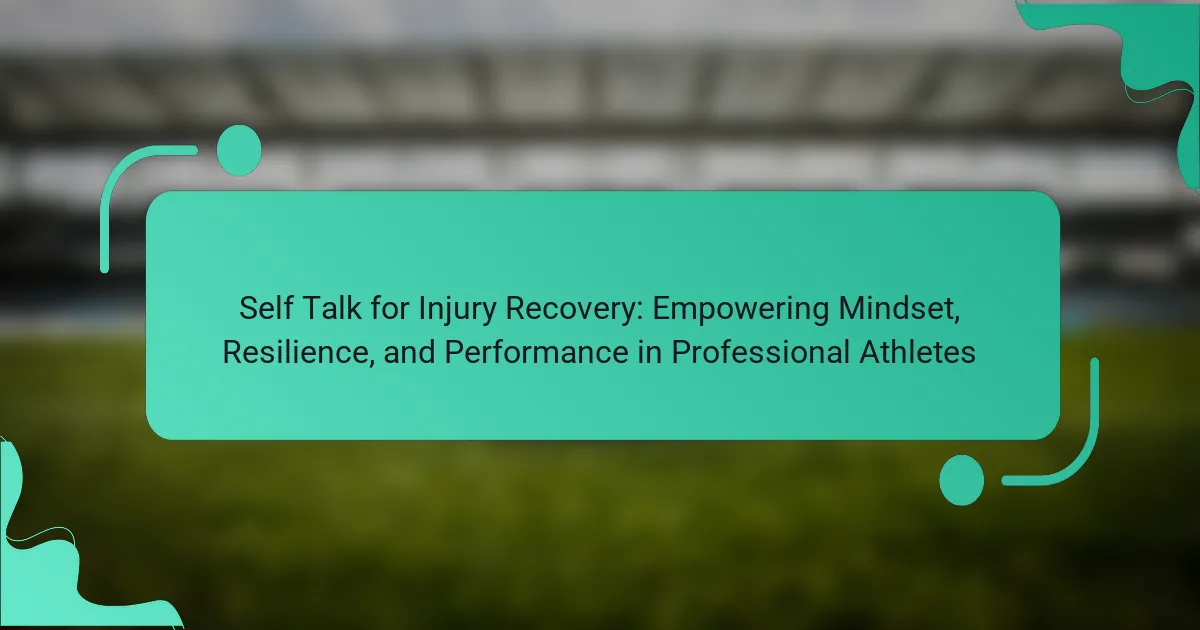Self-talk is crucial for injury recovery in professional athletes, enhancing mindset and resilience. It reduces anxiety, improves focus, and boosts motivation during rehabilitation. Techniques like positive affirmations and visualization accelerate healing and optimize performance post-injury. Implementing consistent self-talk strategies can lead to better recovery outcomes and a return to peak athletic form.

How Does Self-Talk Influence Injury Recovery in Professional Athletes?
Self-talk significantly enhances injury recovery in professional athletes by fostering a positive mindset and resilience. Athletes who engage in constructive self-talk experience reduced anxiety, improved focus, and greater motivation during rehabilitation. Research indicates that positive self-statements can lead to enhanced performance outcomes and quicker recovery times. For instance, athletes utilizing affirmations report a 20% improvement in their perceived recovery rate. This mental strategy empowers athletes to overcome psychological barriers, ultimately leading to better physical results and a return to peak performance.
What are the key components of effective self-talk?
Effective self-talk for injury recovery includes positive affirmations, goal setting, visualization, and reframing negative thoughts. These components foster resilience and empower pro athletes to maintain a focused mindset. Positive affirmations reinforce self-belief, while goal setting provides direction. Visualization enhances mental imagery of recovery, leading to improved performance. Reframing negative thoughts transforms challenges into opportunities for growth, promoting a proactive approach to healing.
How can positive self-talk enhance resilience during rehabilitation?
Positive self-talk significantly enhances resilience during rehabilitation by fostering a supportive mental environment. It encourages athletes to maintain motivation, focus, and a belief in their recovery capabilities. Research indicates that positive self-talk can reduce anxiety and improve performance outcomes, making it a critical tool in the rehabilitation process. By reinforcing a growth mindset, athletes are better equipped to navigate challenges and setbacks, ultimately leading to a more effective recovery journey.
What techniques can athletes use to cultivate positive self-talk?
Athletes can use techniques like visualization, positive affirmations, and reframing thoughts to cultivate positive self-talk. These methods enhance mindset, resilience, and performance during injury recovery. Visualization helps athletes imagine successful recovery scenarios, while positive affirmations reinforce self-belief. Reframing negative thoughts into constructive ones promotes a resilient outlook.
How does visualization complement self-talk in recovery?
Visualization enhances self-talk in recovery by reinforcing positive mental imagery, which boosts confidence and motivation. This synergy helps athletes overcome mental barriers, fostering resilience and improving performance. Effective visualization techniques can create vivid scenarios that align with positive self-talk, allowing for a more comprehensive approach to injury recovery. As a result, athletes experience a stronger sense of control and focus, ultimately facilitating a quicker return to peak performance.
What role does self-talk play in maintaining motivation during injury?
Self-talk significantly influences motivation during injury recovery by fostering a positive mindset and resilience. It helps athletes maintain focus on recovery goals, enhancing their performance when returning to sport. Positive self-talk can reduce anxiety and increase self-efficacy, essential for overcoming mental barriers. Research shows that athletes who engage in constructive self-talk experience faster recovery times and improved emotional well-being.
How can athletes identify negative self-talk patterns?
Athletes can identify negative self-talk patterns by monitoring their internal dialogue during training and competition. They should recognize recurring phrases that evoke doubt or fear, such as “I can’t” or “I’m not good enough.” Journaling these thoughts can help highlight triggers and frequency. Additionally, seeking feedback from coaches or teammates can provide external perspectives on negative self-talk. Recognizing these patterns is crucial for developing a resilient mindset and improving overall performance.
What are common examples of negative self-talk in athletes?
Common examples of negative self-talk in athletes include thoughts like “I can’t do this,” “I’m a failure,” and “I’ll never recover.” These phrases undermine confidence and hinder performance. Negative self-talk can be rooted in past injuries or performance setbacks, leading to a cycle of doubt. Recognizing and reframing these thoughts is essential for fostering resilience and a positive mindset during injury recovery.
How can reframing negative thoughts improve recovery outcomes?
Reframing negative thoughts significantly enhances recovery outcomes by fostering a positive mindset. This approach encourages pro athletes to focus on their strengths and progress rather than setbacks. Research indicates that athletes who practice positive self-talk experience reduced anxiety and improved performance metrics. A study found that athletes utilizing cognitive restructuring techniques reported a 30% increase in motivation levels during recovery phases. By cultivating resilience through reframing, athletes can better manage challenges, ultimately leading to more successful recovery and performance.

What unique benefits does self-talk provide during injury recovery?
Self-talk provides unique benefits during injury recovery by enhancing mental resilience, promoting positive emotions, and improving focus. Athletes who engage in constructive self-talk can experience reduced anxiety and increased motivation, which accelerates healing. Research shows that positive self-talk can lead to better pain management and quicker rehabilitation outcomes. This mental strategy empowers athletes to maintain a positive outlook, helping them stay committed to recovery goals.
How does self-talk impact emotional regulation in athletes?
Self-talk significantly enhances emotional regulation in athletes by fostering a positive mindset. It helps manage stress and anxiety during injury recovery, promoting resilience and performance. Research indicates that athletes using constructive self-talk experience improved emotional stability and focus, leading to better recovery outcomes. This psychological strategy empowers athletes to maintain motivation and overcome challenges, ultimately enhancing their overall performance.
What unique strategies can be employed for self-talk in different sports?
Pro athletes can employ unique self-talk strategies tailored to their specific sport. For endurance sports, focusing on positive affirmations enhances resilience during long training sessions. In team sports, using motivational phrases can foster collaboration and unity. Individual sports benefit from visualization techniques combined with self-encouragement to boost confidence. Additionally, incorporating sport-specific jargon in self-talk can create a mental edge by reinforcing familiarity and expertise.

What rare attributes of self-talk can enhance performance post-injury?
Self-talk can enhance performance post-injury through unique attributes like visualization, affirmations, and self-compassion. Visualization helps athletes mentally rehearse movements, improving confidence and coordination. Affirmations reinforce a positive mindset, fostering resilience. Self-compassion allows for acceptance of setbacks, promoting a healthier recovery process. These rare self-talk strategies empower athletes to overcome mental barriers and optimize their return to peak performance.
How can self-talk be tailored to individual athlete personalities?
Self-talk can be tailored to individual athlete personalities by focusing on their unique motivational triggers and coping strategies. For instance, analytical athletes may benefit from structured self-talk that emphasizes data and performance metrics, while more emotionally driven athletes might respond better to affirmations that enhance their confidence. Understanding personality types allows coaches to customize self-talk techniques, fostering resilience and enhancing recovery during injury. This personalized approach can lead to improved mental strength and performance outcomes.
What uncommon self-talk practices have proven effective in elite sports?
Uncommon self-talk practices that enhance recovery in elite sports include visualization techniques, affirmations, and reframing negative thoughts. Athletes utilize these methods to foster resilience and maintain a positive mindset during injury recovery. For example, visualization allows athletes to mentally rehearse their return to performance, enhancing motivation. Affirmations reinforce self-belief, while reframing shifts focus from limitations to opportunities for growth. These practices collectively empower athletes to navigate challenges, ultimately improving their performance post-injury.

What are the best practices for implementing self-talk strategies?
To implement self-talk strategies effectively, focus on positive affirmations, visualization techniques, and consistent practice. These practices enhance resilience and performance in athletes recovering from injuries.
1. Use positive affirmations to reinforce self-belief and motivation.
2. Incorporate visualization techniques to mentally rehearse successful outcomes.
3. Practice self-talk consistently to create a habit that strengthens the mindset.
4. Monitor and adjust self-talk based on emotional responses and performance feedback.
How can athletes create a personalized self-talk plan for recovery?
Athletes can create a personalized self-talk plan for recovery by identifying specific recovery goals and crafting affirmations that align with those goals. This involves recognizing negative thought patterns and replacing them with positive, empowering statements. Engaging in regular practice of these affirmations can enhance resilience and foster a growth mindset. Additionally, athletes should tailor their self-talk to reflect their unique experiences and challenges during recovery, ensuring it remains relevant and motivating.
What common mistakes should athletes avoid in their self-talk?
Athletes should avoid negative self-talk, overgeneralization, and self-criticism during injury recovery. These mistakes can undermine resilience and hinder performance. Negative self-talk creates a defeatist mindset, while overgeneralization leads to a belief that one failure defines overall ability. Self-criticism can diminish motivation and confidence, making recovery more challenging. Cultivating positive affirmations and focusing on incremental progress can enhance mental resilience and support effective recovery.
How can coaches support athletes in developing effective self-talk?
Coaches can enhance athletes’ self-talk by teaching techniques that promote positive thinking and resilience. Strategies include modeling effective self-talk, encouraging visualization, and providing constructive feedback. Regular workshops on mindset can reinforce these skills. Additionally, fostering an environment where athletes share experiences can strengthen their self-talk practices.
What expert insights can enhance the understanding of self-talk in injury recovery?
Expert insights into self-talk during injury recovery emphasize its role in fostering a positive mindset and resilience. Athletes who engage in constructive self-talk report enhanced motivation, reduced anxiety, and improved performance outcomes. Research indicates that specific phrases, such as “I am strong” or “I will recover,” can significantly impact emotional states and recovery processes. Additionally, mental imagery combined with positive self-talk can accelerate healing by reinforcing a proactive attitude. These insights highlight the importance of tailored self-talk strategies in optimizing recovery for professional athletes.
